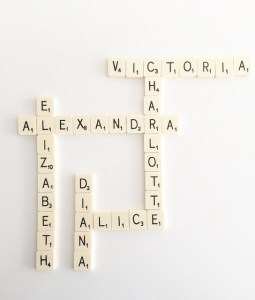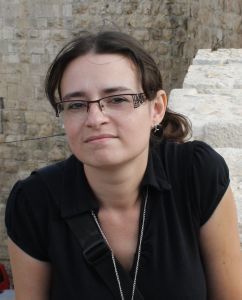What’s in a (Character’s) Name?
For some of us, coming up with names is easy—just pick one that sounds right, or one you’ve been in love with forever. And sometimes it truly is that easy. But what if you want your characters’ names to be more meaningful, to be a better fit for your story? Olga Kuno’s got some great ideas on how to come up with just the right names for your cast members.

Courtesy: Jonathan Rolande @ Creative Commons
You’re about to start writing a new novel. Maybe you’ve already carefully developed a plan for each chapter. Maybe you have a plan for a couple of chapters only and, at this stage, have no idea what’s going to happen afterwards. In any event, there’s something you need to know from the very beginning: the names of your important characters.
If you’re writing a realistic novel with the plot unfolding in the actual world, in a specific country at a specific time, this imposes at least some limitations, but the range of names you can choose from is still wide. But what if you’re working on a fantasy or sci-fi novel, describing events that are taking place in an imaginary world? In that case, the sky’s the limit. You’re free to choose any name of any nationality that has been used at any period. Moreover, you can even invent a name of your own.
Coming up with just the right name can be daunting. I’d like to share some ideas on how to simplify the process.
Meanings
I suppose “meaning” is the most obvious reason to choose a particular name. After all, names are derived from words that are meaningful in some language or other.
‘My name is Alice, but —’
‘It’s a stupid name enough!’ Humpty Dumpty interrupted impatiently. ‘What does it mean?’
‘Must a name mean something?’ Alice asked doubtfully.
‘Of course it must,’ Humpty Dumpty said with a short laugh: ‘my name means the shape I am — and a good handsome shape it is, too. With a name like yours, you might be any shape, almost.’
Through the Looking Glass, Lewis Carroll
Humpty Dumpty isn’t quite right, but in literature, it’s definitely possible to give one’s heroes names that say something about their character. Consider America Singer, the protagonist of The Selection by Kiera Cass. Her surname says something about her: she’s a musician and a singer. Yet another example is Mr. Knightley from Jane Austen’s Emma. It’s clear to many English-speaking readers that this name emphasizes the character’s nobility.
Sometimes, the meaning can even come from another language. Continuing the topic of music, one of the major heroes in Oksana Pankeeva’s Russian fantasy series is known under the (fake) name of Cantor. In Spanish, the corresponding word means ‘singer’, and indeed, the character was a singer in the past.
Connotations
A name may also obtain content through the connotations it invokes. This happens when it’s identical or similar to the name of a well-known literary or mythological character. For instance, it’s hardly possible to read “Bridget Jones’s Diary” without associating Mark Darcy with Jane Austen’s Mr. Darcy (and when watching the movie, the association becomes even stronger, for obvious reasons!). Indeed, the two characters have certain qualities in common.
Geographical Inspirations
Associations may arise not only with characters but also with the real world. Getting back to America Singer, her first name is obviously identical to a geographical one. This is purposeful, since the heroine brings in certain values that play an important role in the United States but have largely been forgotten and abandoned in Illéa.
Geography can also play a part in a character’s name when the sound of it reminds readers of a particular culture. An invented name that ends in -slav or -mir—Jaroslav, Vladimir, Miromir—will bring to mind the Slavs and the rich culture surrounding them. Leigh Bardugo’s Grisha series is a good example of this. With a main character named Alina Starkov and events occurring in places like Keramzim and Ravka, the names are perfect for her story set in an alternate pre-revolution Russia.
Playing Games With Names
Yet another possibility is to think of a name that you can mess around with. A well known example is young Voldemort from the Harry Potter books. Tom Marvolo Riddle is an anagram for “I am Lord Voldemort.” And, obviously, Riddle also holds meaning. For a different example, consider Karina Dёmina and her novel The Bride. The character has two personalities: Tori and Hilda. So it makes sense for the author to have chosen the name Tornhild, where both personalities are represented.
These are just a few suggestions which may be helpful in resolving the difficult task of name selection. But then, it’s absolutely fine to choose a name because we like the way it sounds. What methods have you used for picking the right names for your characters?
 Born in Moscow and having left Russia in 1991, Olga Kuno has lived in Europe, Asia and America. Having completed her Ph.D. in linguistics, she started writing fantasy romance novels. Today she is both a lecturer in linguistics and a Russian fantasy writer who tries hard not to mention princes, dragons and magicians in her scientific articles. Olga has published 13 fantasy novels in Russian (however scary that number may seem!). In June 2016, her novel “Half a Step Away from Love” was for the first time electronically published in English translation. Her interests include British folklore, linguistic analysis of humor and animal communication.
Born in Moscow and having left Russia in 1991, Olga Kuno has lived in Europe, Asia and America. Having completed her Ph.D. in linguistics, she started writing fantasy romance novels. Today she is both a lecturer in linguistics and a Russian fantasy writer who tries hard not to mention princes, dragons and magicians in her scientific articles. Olga has published 13 fantasy novels in Russian (however scary that number may seem!). In June 2016, her novel “Half a Step Away from Love” was for the first time electronically published in English translation. Her interests include British folklore, linguistic analysis of humor and animal communication.
Road Trip
Angela is over at Writers In The Storm talking about the transition between “writer” and “author,” and the learning curve involved. Feel free to stop by. 
Writers Helping Writers
- Angela Ackerman's profile
- 1014 followers



